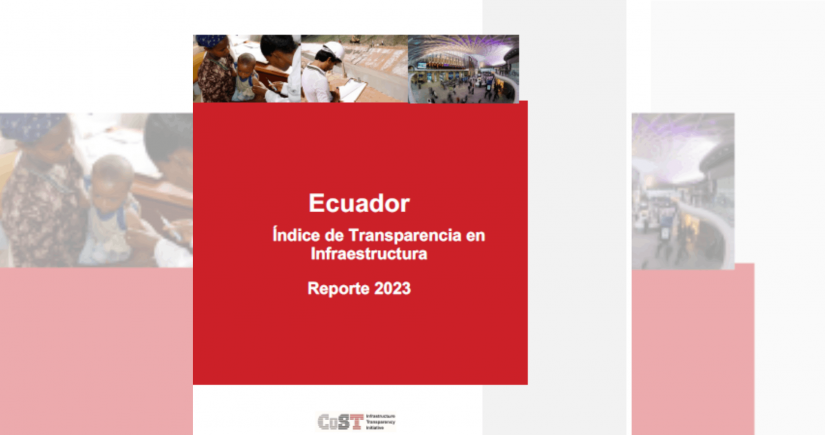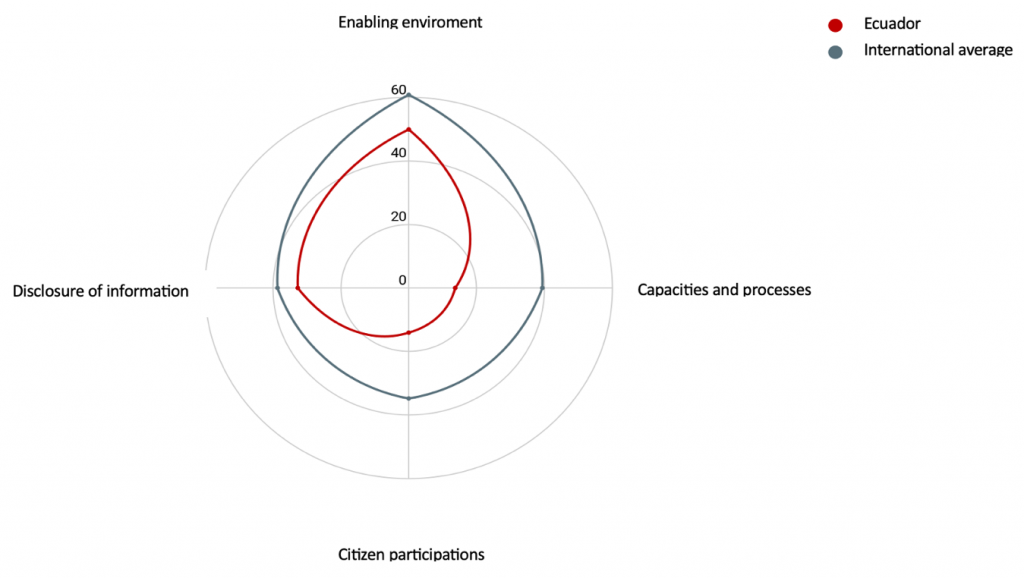By Manuel Gonzalez Caballero
Amid the complexity of the policy context, tools can be developed to help establish a metric of transparency in the infrastructure sector. In recent years, Ecuador has faced an unstable political climate, with protests, changes of authorities, early elections, insecurity, and violence. These elements cannot be excuses for poorly managing public resources and not providing the right transparency mechanisms to citizens.
In this way, within the framework of the Infrastructure Transparency Initiative, CoST Ecuador commissioned their first Infrastructure Transparency Index (ITI). The Index whose results were published in the city of Quito on February 27, 2024, in the attendance of 30 representatives of the private sector, civil society, government, and academia, was developed over a period of six months.
The ITI included 60 infrastructure projects spanning 30 institutions. The methodology for selecting projects was prioritized according to their type, sector, amount of contracting and impact. The institutions evaluated correspond to: the State Administration, public companies of the executive function, Decentralized Autonomous Governments (GAD) and public limited companies with public participation that developed projects between 2017 and June 2022.
The budget for the procurement processes for infrastructure projects corresponding to the sample of contracting entities was USD 3,204,109,319.21; and the total budget of the 60 processes selected in the sample, of USD 493,314,062.28, which represents 15.40% of the total procurement processes for infrastructure projects during the study period.
Conceived collaboratively and based on international best practices and lessons learned, the Infrastructure Transparency Index provides stakeholders with quality information that fosters transparency and drives improvements in public infrastructure management. In this sense, with an overall score of 27.65, Ecuador has abundant room for improvements in infrastructure transparency at the national level.
Specifically, the ITI allows us to provide a metric on transparency in Infrastructure in the country based on four dimensions (Facilitating environment, Capacities and processes, Citizen participation and Information dissemination), which through a group of indicators and sub-indicators tells us the situational topography of the country on the matter.
The country’s result in the Facilitating Environment indicator was 28 points out of a maximum of 100, with the Latin American average being 46.5 and the global average being 43, which generates significant concern on the part of civil society organizations, the private sector, and the government, on the need for concerted and unceasing efforts for advocacy on increased infrastructure transparency, participation, and accountability.
Regarding Capacities and processes – with a score of 13.68 – it is inferred that, although there is a basic understanding and digital capabilities present, these are not robust enough to ensure effective and transparent management of infrastructure projects.
The work that has to be done is arduous, mainly in the dimension of Citizen Participation, in which a score of 13.99 out of 100 was obtained.
This metric allows us to organize the CoST implementation strategy in the country at the national and local level. It also allows and provides relevant data to decision makers to strengthen democratic mechanisms in the Public Infrastructure sector.
The Disclosure analysis reveals some progress in transparency in project identification and the acquisition of construction contracts. However, there is much room for improvement in project preparation, construction contract implementation, and supervision contract procurement. In this sense, the ITI granted a score of 32.79 in this dimension.
It is important to measure the implementation of infrastructure transparency commitments, using the tools that the Infrastructure Transparency Initiative uses to strengthen infrastructure governance. These national level experiences help inform experiences and lessons across the Latin America region and the CoST members globally. He pointed out with concern on the worrying situation in terms of citizen participation across the region.
Recommendations derived from the report include considering a comprehensive approach to strengthen management capacities and processes, improve citizen participation and increase information dissemination to achieve a higher level of transparency in this critical sector.
Likewise, it suggests ensuring the effective implementation and updating of digital tools for the dissemination of information, such as the OCDS (Open Contracting Data Standard) and the development of projects in the Geographic Information System (GIS) to latest tools such as the Open Contracting for Infrastructure Data Standard (OC4IDS).
It also points out the importance of updating and reinforcing legislation for public infrastructure projects and implementing a robust monitoring and evaluation system, that allows measuring the progress and effectiveness of policies and practices of transparency in the infrastructure sector.
This task was possible with support from the CoST International Secretariat, led by David Zamora; the Datalat research team, under the coordination of Eng. Julio López, with the support of Lisette Zambrano and Ana Aguilera; as well as the Multisectorial Group of CoST Ecuador, made up of the following organizations: Fundación Ciudadanía y Desarrollo (FCD), Fundación Vinicio Ayala, IAEN, SERCOP, Quito Honesto, Ministry of Transportation and Public Works, College of Civil Engineers of Ecuador and the College of Civil Engineers of Pichincha.
More details about the results of the Infrastructure Transparency Index Ecuador 2024 can be consulted on the portal: www.infrastructuretransparencyindex.org and at www.costecuador.org

